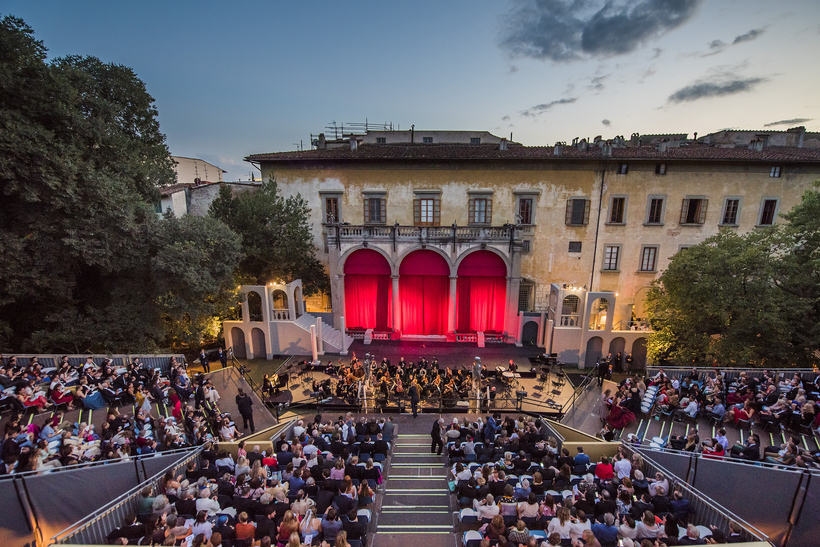At 28, Maximillian Fane is one of the U.K.’s youngest classical music conductors. He is also the co-founder and artistic director of the New Generation Festival, a venture launched in 2017 to engage young audiences with classical music, opera, and jazz—genres not immediately associated with millennials. Fane organizes the festival annually in the gardens of Florence’s Palazzo Corsini. But this year, it’ll look a little different, taking place in the Uffizi Galleries’ Boboli Gardens, a venue that can better accommodate social distancing. In a gesture of generosity, New Generation has been renamed ReGeneration, with proceeds going to young Florentine artists. Fane is aiming to help build the next generation of classical music, and to help rebuild an economy hit hard by the pandemic. Elena Clavarino spoke with Fane about his career and how he expects ReGeneration to play out this year.
Elena Clavarino: You were awarded a prize for your masters dissertation on “strategy in the classical music industry.” What is your strategy with the New Generation Festival and, this year, ReGeneration?
Maximillian Fane: It is so important to make sure that what we do joins up with an overall strategy to promote the arts in a sustainable way for the future. The New Generation Festival focuses on two key aspects. One is promoting world-class opportunities for the best young artists, and creating a healthy and sustainable way to support these artists at the start of their careers. The other is about opening up classical music, opera, and all great music to new and younger audiences—it’s about the health of the ecosystem, from the perspectives of artists, audiences, and donors.
How did you decide on this year’s programming?
It’s always important to try to balance repertoire that we feel our relatively new-to-opera audience will find accessible, beautiful, and challenging, with the need for programming that suits and challenges our emerging artists vocally. Our “Great music is great music” motto is at the center of what we do—we work hard to have a diverse makeup of artists who can feed off each other and create new avenues of expression. We tend to be led by artists we would like to collaborate with, rather than by repertoire.

How do you attract younger crowds to opera and classical music?
We take a very simple approach to this challenge. We feel it is vital not to compromise on quality, or patronize our audience in any way. We have a vast array of music on offer, but with an unashamed focus on opera and classical music, because of their universality. We make young people feel invited both by the way we operate the festival but also by the fact that all of our 200-plus artists, costume designers, stage managers, and administrators are under the age of 35. When you come to the New Generation Festival, you enjoy an entire opera along with dance, food, conversation, and an array of other music and artistic experiences.
What do you look for in young performers?
Apart from the basic requisite of hard work, we look for flexibility, resilience, and a sense of humor.
Why do you host the festival in Florence?
Where better to demonstrate the restorative power of the arts than from the city of the Renaissance?
In previous years you held the festival at the Palazzo Corsini gardens. What will this year’s festival look like?
The ReGeneration Festival reflects our team’s aim to reimagine how live music and opera can be presented in a way that embraces our new limitations. To survive, flexibility, collaboration, and creativity are fundamental. This is why we’re immensely proud to be staging the ReGeneration Festival in partnership with the Uffizi Galleries. It’s an unprecedented four-day program of socially-distanced concerts and productions running from August 26 to 29 at the landmark Boboli Gardens, near the Pitti Palace, and it will be offered to audiences entirely for free while also being streamed live online. The hope is to provide some light at a time when so many other festivals and shows have been cancelled.

How will you make a socially distanced concert fun? Is there going to be a theme?
We have the incredible combination of beautiful surroundings and technology that will awe the senses. Using video mapping, we are turning our theater into an extraordinary fairy tale dreamscape inspired by the milieu and dress of Louis XIV’s court, to host the singers of Rossini’s Cinderella. People are welcome to come dressed in inventive ways to make social distancing fun, but the entire evening is designed to ensure we remain within the safety parameters at this critical moment. The great advantage of the Boboli Gardens is the enormity of the space.
Proceeds from this year’s festival are going towards the city of Florence. Do you think the pandemic has made people want to give back more to their communities?
Our new foundation will be creating a COVID-response fund to support young artists in this city and beyond. The hope is that our gesture of humanity in staging this festival will inspire people to see how the arts can lead the way during such a crisis, and that now is as important a time as ever to support the arts.
What is the future of classical music in a post-coronavirus world?
I believe that people can no longer take anything for granted, especially provisions for the arts. The arts can be a way to heal and to reinvent society in this post-COVID world. We have to ask ourselves, What is it that we are living and working for? If we can behave boldly and with vision at this time, the arts can provide strong answers to these important questions, and show the way to a better and more caring society.
Elena Clavarino is an Associate Editor at AIR MAIL


 Discover
Discover